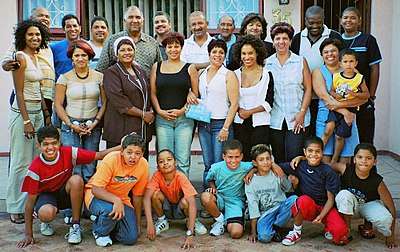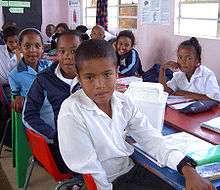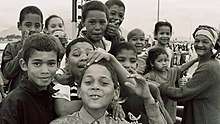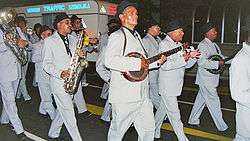Cape Coloureds
In Southern Africa, Cape Coloureds (Afrikaans: Kaapse Kleurling) are an ethnic group composed primarily of persons of mixed race. Although Cape Coloureds form a minority group within South Africa, they are the predominant population group in the Western Cape.
Kaapse Kleurlinge | |
|---|---|
 Extended coloured family with roots in Cape Town, Kimberley and Pretoria | |
| Total population | |
| 4,771,500[1] (In South Africa only, 2015) | |
| Regions with significant populations | |
| South Africa, Namibia, Zimbabwe, Lesotho | |
| Languages | |
| Afrikaans, South African English | |
| Religion | |
| Christian (80%), Muslim (5%)[2] | |
| Related ethnic groups | |
| Afrikaners, Khoikhoi, Basters, Xhosa, Tswana, Cape Malay, Indian South Africans |
They are generally bilingual, speaking Afrikaans and English, though some speak only one of these. Some Cape Coloureds may code switch,[3] speaking a patois of Afrikaans and English called Afrikaaps also known as Cape Slang (Capy) or Kombuis Afrikaans, meaning Kitchen Afrikaans. Cape Coloureds were defined under the apartheid regime as a subset of the larger Coloured race group.
At least one genetic study indicates that Cape Coloureds have an ancestry consisting of the following ethnic groups:[4]
- Khoisan: (32–43%)
- Bantu-speaking Africans: (20–36%)
- Ethnic groups in Europe: (21–28%)
- Asian peoples: (9–11%)
Origin and history
The Cape Coloureds are a heterogeneous South African ethnic group, with diverse ancestral links. Ancestry may include European colonizers, indigenous Khoisan and Xhosa people, and slaves imported from the Dutch East Indies (or a combination of all).[5] People from India and the islands within the Indian Ocean region were also taken to the Cape and sold into slavery by the Dutch settlers. The Indian slaves were almost invariably given Christian names but their places of origin were indicated in the records of sales and other documents so that it is possible to get an idea of the ratio of slaves from different regions. These slaves were, however, dispersed and lost their Indian cultural identity over the course of time. Slaves of Malay and other ancestry were brought from India, Indonesia, Malaysia, Madagascar, and Mozambique. This diverse assortment of people was subsequently classified as a single group under the Apartheid regime.[6]
Under Apartheid, under the Population Registration Act as amended, the term Cape Coloured referred to a subset of Coloured South Africans, with subjective criteria having been used by the bureaucracy to determine whether a person was a Cape Coloured, or belonged to one of a number of other related subgroups such as the "Cape Malays", or "Other Coloureds".[7][8]
Cape Coloureds in the media



A group of Cape Coloureds were interviewed in the documentary series Ross Kemp on Gangs. One of the gang members who participated in the interview mentioned that black South Africans have been the main beneficiaries of South African social promotion initiatives while the Cape Coloureds have been further marginalised.
The film I'm Not Black, I'm Coloured - Identity Crisis at the Cape of Good Hope (Monde World Films, 2009 USA release) is one of the first historical documentary films to explore the legacy of Apartheid through the viewpoint of the Cape Coloured community, including interviews with elders, pastors, members of Parliament, students and everyday people struggling to find their identity in the new South Africa.[9]
Various books have covered the subject matter of Coloured identity and heritage.
Patric Tariq Mellet, heritage activist and author of 'The Camissa Embrace' and co-creator of The Camissa Museum, has composed a vast online blog archive ('Camissa People') of heritage information concerning Coloured ancestry tracing to the Indigenous San and Khoe and Malagasy, East African, Indonesian, Indian, Bengal and Sri Lankan slaves.
Terminology
The term "coloured" is currently treated as a neutral description in Southern Africa, classifying people of mixed race ancestry.
Once used in the Western countries as well, especially so in North America, the term has shifted in meaning and is now regarded as derogatory in the Western World; a newly-coined term "person of color" has since become common and preferred by the members of the community and the general populace. This term tends to mean any non-white person, as opposed to a mixed-race person, where the term "multiracial" is used. "Coloured" may also be seen as offensive in some other western countries, such as Britain and the United States of America.[10]
Notable people-Politics
- Midi Achmat, South African writer and LGBT rights activist
- Zackie Achmat, South African HIV/AIDS activist & filmmaker
- Neville Alexander, Political activist, educationalist & lecturer.
- Allan Boesak (Political activist & Cleric).
- Patricia de Lille, former PAC, then Independent Democrats leader, then Democratic Alliance mayor of Cape Town, now leader of Good Party
- Tony Ehrenreich, South African trades unionist.
- Zainunnisa Gool, South African Political activist & representative on the Cape Town City Council.
- Alex La Guma, South African novelist & leader of the South African Coloured People's Organisation
- Trevor Manuel, former Finance Minister, currently Head of the National Planning Commission of South Africa.
- Gerald Morkel, former mayor of Cape Town
- Dan Plato, Western Cape Community Safety Minister.
- Dulcie September, political activist.
- Lindiwe Sisulu, minister.
- Max Sisulu, politician.
- Walter Sisulu, political activist.
- Zwelakhe Sisulu, politician.
- Adam Small, political activist, poet and writer.
- Percy Sonn, former president of the International Cricket Council.
Artists and writers
- Peter Abrahams, writer
- Tyrone Appollis, academic
- Willie Bester
- Dennis Brutus, journalist, poet, activist
- Peter Clarke
- Phillippa Yaa de Villiers, writer & performance artist
- Garth Erasmus, artist
- Diana Ferrus, poet, writer & performance artist
- Oliver Hermanus, writer, Director
- Rozena Maart, writer
- Mustafa Maluka
- Dr. Don Mattera
- James Matthews, writer
- Selwyn Milborrow, poet, writer, journalist
- Arthur Nortje, poet
- Robin Rhode
- Richard Moore Rive, writer
- Tracey Rose
- Adam Small, writer
- Zoë Wicomb, writer
- Athol Williams, poet, writer, scholar, social philosopher
Actors / actresses
- Quanita Adams, actress
- Natalie Becker, actress
- Lesley-Ann Brandt, actress
- Meryl Cassie, actress from the TV series The Tribe.
- Vincent Ebrahim, actor
- Vinette Ebrahim, actress
- Kim Engelbrecht, actress, Dominion, Isidingo, The Flash
- Kandyse McClure, actress, Battlestar Galactica (2004 TV series)
Beauty queens
- Tansey Coetzee, Miss South Africa 2007
- Tamaryn Green, Miss South Africa 2018
- Tatum Keshwar, Miss South Africa 2008
- Amy Kleinhans, former Miss South Africa 1992 and first non-white Miss South Africa.
- Liesl Laurie, Miss South Africa 2015
- Demi-Leigh Nel-Peters, Miss South Africa 2017 and Miss Universe 2017
- Jo-Ann Strauss, Miss South Africa 2000, media personality and business woman.
Musicians
- AKA, hip hop recording artist
- Jonathan Butler, jazz musician.
- Paxton Fielies, singer
- Jean Grae, hip hop artist.
- Paul Hanmer, pianist & composer
- Abdullah Ibrahim, jazz pianist
- Robbie Jansen, musician
- Trevor Jones, South African born film composer.
- Sho Madjozi, musician
- Taliep Petersen, musician & director
- YoungstaCPT, rapper
Others
- Marc Lottering, comedian.
- Trevor Noah, Stand up comedian
- Jenny Powell, television presenter.
Athletics
- Shaun Abrahams, 800m runner
- Cornel Fredericks, track & field sprinter
- Paul Gorries, Sprinter
- Leigh Julius, 2004- 2008 Olympian
- Geraldine Pillay, 2004 Olympian, Commonwealth medallist
- Wayde van Niekerk, track & field sprinter, Olympic and World Champion, and World Record Holder
Cricket
Field Hockey
Football
- Cole Alexander
- Andre Arendse
- Tyren Arendse
- Wayne Arendse
- Bradley August
- Brendan Augustine
- Emile Baron
- Shaun Bartlett
- Delron Buckley
- Daylon Claasen
- Rivaldo Coetzee
- Lance Davids
- Keagan Dolly
- Kermit Erasmus
- Jody February
- Taariq Fielies
- Quinton Fortune
- Bevan Fransman
- Stanton Fredericks
- Reeve Frosler
- Morgan Gould
- Victor Gomes, referee
- Travis Graham
- Ashraf Hendricks
- Rudi Isaacs
- Willem Jackson
- Moeneeb Josephs
- David Kannemeyer
- Ricardo Katza
- Daine Klate
- Lyle Lakay
- Lee Langeveldt
- Clinton Larsen
- Stanton Lewis
- Benni McCarthy, South Africa national team's all-time top scorer with 31 goals
- Fabian McCarthy
- Leroy Maluka
- Grant Margeman
- Bryce Moon
- Nasief Morris
- Tashreeq Morris
- Ace Ncobo, referee
- Reagan Noble
- Riyaad Norodien
- Bernard Parker
- Peter Petersen
- Brandon Peterson
- Steven Pienaar
- Reyaad Pieterse
- Wayne Roberts
- Frank Schoeman
- Ebrahim Seedat
- Brandon Silent
- Elrio van Heerden
- Shu-Aib Walters
- Mark Williams, scored both the goals in the victorious final of the 1996 African Cup of Nations
- Ronwen Williams
Rugby
- Gio Aplon
- Nizaam Carr
- Kurt Coleman, Western Province & Stormers player
- Bolla Conradie
- Juan de Jongh
- Peter de Villiers
- Bryan Habana
- Cornal Hendricks
- Adrian Jacobs
- Conrad Jantjes
- Elton Jantjies
- Ricky Januarie
- Ashley Johnson
- Cheslin Kolbe, Western Province & Stormers player
- Dillyn Leyds, Western Province & Stormers player
- Lionel Mapoe
- Breyton Paulse
- Earl Rose
- Errol Tobias
- Ashwin Willemse
- Chester Williams
Others
- Raven Klaasen - tennis player
- Devon Petersen - darts player
- Kenny Solomon, South Africa's first chess grandmaster
See also
References
- Mid-year population estimates, 2015 (PDF) (Report). Statistics South Africa. 31 July 2015. p. 3. Retrieved 11 August 2015.
- "The Coloureds of Southern Africa". MixedFolks.com. Archived from the original on 17 May 2008. Retrieved 2009-10-23.
- Stell, Gerald (2010). "Ethnicity in linguistic variation". Pragmatics. 20 (3): 425–447. doi:10.1075/prag.20.3.06ste. ISSN 1018-2101.
- de Wit, E; Delport, W; Rugamika, CE; Meintjes, A; Möller, M; van Helden, PD; Seoighe, C; Hoal, EG (August 2012). "Genome-wide analysis of the structure of the South African Coloured Population in the Western Cape". Human Genetics. 128: 145–53. doi:10.1007/s00439-010-0836-1. PMID 20490549.
- Khan, Razib (16 June 2011). "The Cape Coloureds are a mix of everything". Discover Magazine. Retrieved 26 January 2013.
- "History of Slavery and early colonisation in SA". South African History Online. Retrieved 26 January 2013.
- Valentine, Sue. "An appalling "science"". The Sunday Times. Archived from the original on 23 April 2012. Retrieved 2013-01-26.
- Leach, Graham (1986). South Africa: No Easy Path to Peace. Routledge & Kegan Paul. pp. 70–. ISBN 978-0-7102-0848-4.
- Szafraniec, Gina (3 April 2011). "Millions Will Watch". The Bloomington Crow. Archived from the original on 27 April 2011. Retrieved 26 January 2013.
- "Is the word 'coloured' offensive?". BBC News. 9 November 2006. Retrieved 5 June 2019.
- Adhikari, Mohamed (2005). Not White Enough, Not Black Enough: Racial Identity in the South African Coloured Community. Ohio University Press. ISBN 978-0-89680-442-5.CS1 maint: ref=harv (link)
- Boggenpoel, Jesmane (2018). My Blood Divides and Unites: Race, Identity, Reconciliation. Porcupine Press. ISBN 978-1-928455-28-8.CS1 maint: ref=harv (link)
- Richards, Ruben Robert (2018). Bastaards Or Humans: The Unspoken Heritage of Coloured People. Indaba. ISBN 978-1-947599-06-2.CS1 maint: ref=harv (link)
- Van Wyk, Chris (2006). Shirley, Goodness & Mercy: A Childhood in Africa. Picador. ISBN 978-0-330-44483-5.CS1 maint: ref=harv (link)